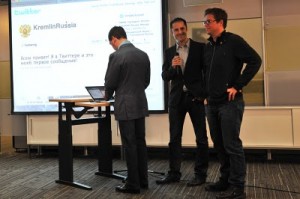Archive for the ‘eGovernment’ Category
At the Moscow City Court website a new section — «E-Office» — has been launched this week. Here you can find information on all criminal, civil and administrative cases first, second and supervisory institutions, which are in production. Here you can find information not only on cases that have just arrived in court or on which decisions and convictions, but deferred or transferred to other courts. Moreover, with the texts of relevant legal documents.
However, you can get complete information on the work of justices of the peace in Moscow — the territorial jurisdiction, contact information, lists of cases, the docket text of judicial documents. On the pages of this site, citizens have the opportunity in a simple and convenient way not only to obtain all necessary information and automatically but also to calculate the amount of public duty, to simulate directions to the site and need a court to determine the jurisdiction of the address of residence.
On the website it’s noted that the texts adopted by the court acts pursuant to the requirements of federal law «On ensuring access to information about ships in the Russian Federation» will appear at specified sites within 7 days from the date of entry into force.
From the middle of last year Russia has an official portal, where citizens can get about 40 different kinds of public services — gosuslugi.ru
The Government plans to implement all the commitments to implement e-government in Russia in 2014. At the same time, as the head of the Ministry of Communications says, there is no guarantee that it will be implemented everywhere in the country by the deadline.
Minister Igor Shchegolev recalled that in this area there is the distribution of powers between the federal government, regional and municipal authorities. The last two government encourages the active introduction of electronic public services but vouch for the full, that they have enough time, according to Shchegoleva can be difficult.
According to the UN standard of Russia’s readiness for e-government leaves much to be desired. According to this indicator in 2010 Russia set a seat for 59 out of 180. Ahead of Russia was Kazakhstan (46 seat) and Ukraine (54 seat). One factor that takes into account when assessing the readiness of the UN country to introduce e-government is the level of computer literacy and access to information technology. Thus, according to the Public Opinion Foundation in late 2009 beginning 2010., Internet access and use of electronic services, there are only 37% of Russians. According to the Russian-American project of educational programs PH International, computer skills are not the order of 100 million citizens of Russia.
At the International Economic Forum in St. Petersburg, Microsoft introduced the vision of electronic government. Solution designed to provide citizens with an opportunity to receive public services online through various channels of access (web-cites of public services, info-boxex, etc.).
The presented solution allows you to make a citizen’s burden for the collection of documents from various departments and transfer it to their own departments, which will become possible with the adoption of several laws, notably the «law of public services.»
For example, if a child is born, he or she can be registered in the register office via the Internet in a simple and convenient form, the same arrange the insurance certificate or to register in the clinic.
The first Microsoft solution in this class was developed in 2001. And later — introduced in several countries, for example, in the UK (2004), where its base running site directgov.co.uk. At St. Petersburgs Forum Microsoft unveiled a prototype implementation of e-government for the citizens of Russia, taking into account existing and discussion of legislation.
In early 2010, Microsoft initiated the program «Your Course» designed to «increase the level of computer literacy in Russia. Under this program before the end of the year is scheduled to open at least 100 centers across the country and train them in the order of 1 million people. A significant part of the training given to training in the use of Windows and Office Suite MS Office.
I nterview with Linda Zekker (Microsoft vice president for government and community organizations) on the interaction of Microsoft’s public sector continue reading
nterview with Linda Zekker (Microsoft vice president for government and community organizations) on the interaction of Microsoft’s public sector continue reading
Company «M2M telematics Ryazan» founded in Ryazan comprehensive route pointer based on the GLONASS / GPS, which is informing passengers about the actual motion graphics and municipal public transport and the time of his arrival online. In Russia such project is realized for the first time.
The first placard installed in the center of Ryazan at a bus stop «House of Artists». Index uses data supplied by the system of monitoring of urban transport on the basis of the GLONASS / GPS, and is able to up to one minute to predict and display on the placards the arrival time of transport. It takes into account all: speed, time stops at traffic lights, traffic jams and much more.
With a route indicator it is also possible to carry out video monitoring of areas adjacent to the bus stop, to provide speakerphone connection between waiting passengers and the manager of the Information Center.
Navigation and traffic monitoring system on the basis of GLONASS/GPS has been set on public transport, taxis and commercial buses of Ryazan. Currently, system with GLONASS is equipped on 80% of public transport, and by September of this year, the GLONASS system will be fully control it.
Satellite equipment is also fitted with more than 300 commercial public transportation, which is about 30% of all transport park of the city. By 2011 it is planned to equip such systems over a thousand units.
 Today Russian President Dmitry Medvedev has registered in Twitter with Virified Account — @KremlinRussia
Today Russian President Dmitry Medvedev has registered in Twitter with Virified Account — @KremlinRussia
Follow our President!
From Russia with Love
We may be a relatively small company of about two hundred employees but we have a global mindset. Twitter is growing very fast internationally these days. In fact, about sixty percent of our usage is outside of the United States. That’s why we are honored today that President Medvedev of Russia stopped by our office for a brief tour and his inaugural Tweet.
It was incredibly generous of the President to stop by with such a busy schedule. Recognizing the power of new technology and learning to leverage it to advance humanity in positive and meaningful ways is a powerful display of leadership. It was a great chance for us to share our passionate belief that the open exchange of information can have a positive global impact.
Mr. President, welcome to San Francisco and Silicon Valley!
A service of correspondence with officials for the citizens will be created in Russia soon.
At the Russian IT-conference on Internet security Igor Shchegolev (Minister of Communications and Mass Communications) told about a new mail service, which will be monitored by the state. Service will be called «National Post» and will be mainly used for communications of ordinary citizens with officials of various levels. The protection of the service against spam, as well as the inviolability of the personal data of users will guaranteed by the state. Letter of any citizen must reach every official.
Electronic correspondence will not be one-sided. Each citizenscan not only send letters, but also to receive replyes from the authorities, as well as socially important and legal information: Invitation to the election, notifications of the Pension Fund.
My interview Government 2.0 in Russia: megabyte democracy — An interview with russian e-gov-expert Alena Popova was published this week.
The author of the blog is Julia Talmazan. She lives in Vancouver and blogging about Russia, from the perspective of someone who was born in the USSR, but grew up in Canada. Thank you Julie for the excellent interview!
In interview I’m sharing with you about 10 points on the current situation in Russian Gov 2.0
Information and statistical system, in which the data will be collected from 50 federal agencies, will start before the end of 2010. Official data of State Statistics should be available for automatic processing.
Prime Minister Vladimir Putin signed a decree about the launch of a single interagency statistical information system (SISIS). According to the document until January 1, 2011 it should be put into operation. The Federal Agency for IT (FAIT) and Russian Statistics coordinate these activities. The first agency is responsible for the technical part of the project (technical support, information security, the use of digital signature), the second — for filling in information (register of statistical indicators, the relevance of the data).
Data from the system will be available at the portal of the state statistics, which will be located at fedstat.ru. It will collect data from 50 federal agencies,including the Ministry of Internal Affairs, the Health Insurance Fund, Ministry of Emergency Situations, Ministry of Defence, etc. The total cost for the implementation of the statistical system from 2007 to 2012 will amount to 194 million rubles.
Currently, portal is under pilot operation, the access for ordinary users to it denied. But system now gives the average prices in the housing market, changes in the value of a fixed basket of goods and services, changes in freight tariffs, etc. The thematic index is blank for demographic and environmental information, data on foreign investment, migrants and others
 This article will dedicated to Tyumen Region of Russian Federation with wide-spread government services in electronic form for citizens.
This article will dedicated to Tyumen Region of Russian Federation with wide-spread government services in electronic form for citizens.
Information System «NetSchool» has been installed in 289 schools in region. 17 medical institutions have begun to use electronic modules «Registry», in the field of utilities services are provided in electronic format «Personal Cabinet».
Most of the region’s population (63%) know about electronic services of the government, the need for such services is significant. Nearly half of residents believe that such services are relevant to the health and utilities.
The main reason why people want to use electronic public services — is getting rid of the queue, bureaucracy and inconvenient work schedule service organizations.
In a number of pilot schools a system of electronic accounting will operate and parents will be able to access it. Module «Reception» in health care settings can reduce the recording time to see a doctor, and its further development from the beginning of 2011 will enable the citizens themselves to make an appointment to doctors through information kiosks and the Internet.
With the «Personal cabinet» residents can obtain information on the personal account, make readings into account, to generate and print a single receipt for payment of housing services. To work with the resources to accomplish the federal law «On personal data», the citizen must personally get a login and password for any user locations.
Khanty-Mansiyskyi Autonomous District — Yugra — is a region of Russian Federation which is actively developing e-government technologies. Today in the district operates 268 centers of public access to the Internet. To achieve greater transparency of authorities official website of this district & the register of public services provided in electronic form have been formed and developed this year.
«We must ensure maximum transparency of UGRA-government, we must guarantee access to information on government and opportunity for getting e-services for citizens», — said Natalya Koarova, the head of the region.
Ugra — the first region in Russia, which began to introduce on its territory a project of the International Fund ECDL «E-citizen», aimed at ensuring the free information flow between government and citizens through information technology. The essence of this project is training peolpe the basics of information technology, and the main target group of the project are those who have never worked with a computer. Training takes place within a single European procedure, and after every participant issued an international certificate — a passport of e-citizen.






